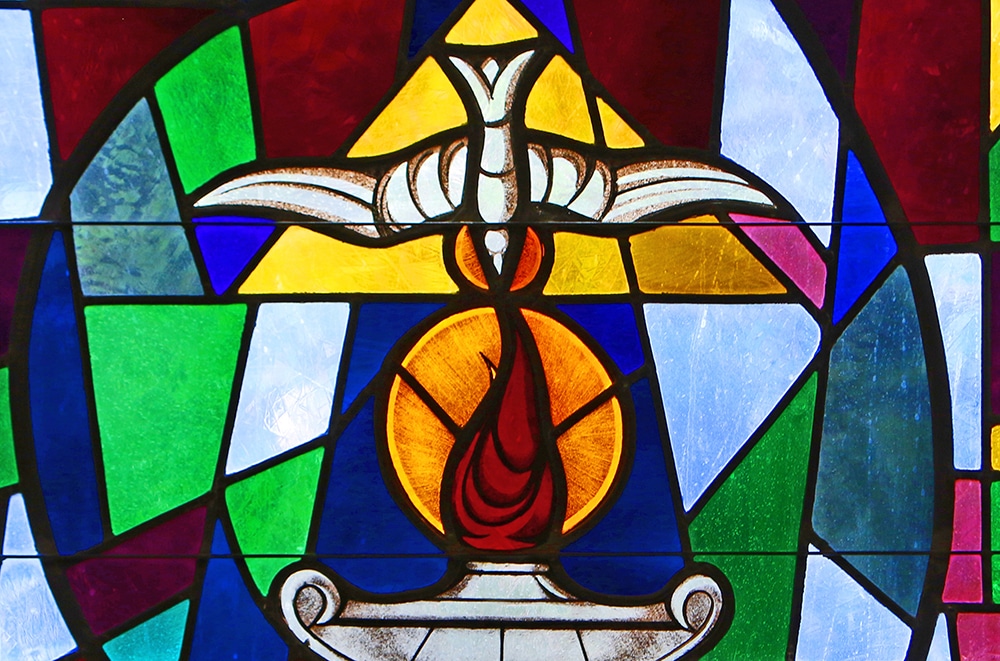
— Name, location withheld
Answer: Many do struggle to relate to the Holy Spirit as a person for two reasons. First, the images of Father and Son speak to our human experience of personhood. A father or a son is person whom we can see and relate to. But in English, “spirit” more usually speaks to the notion of a force, or a power, an inspiration or a thought, not a person. Thus, it is harder for many to relate personally to the Holy Spirit. Images of the Holy Spirit also are less personal: a dove, tongues of fire, a rushing wind, fire and so forth. So, it is more of a challenge to a have a personal relationship with the Holy Spirit.
Yet, to be sure, Jesus speaks of the Holy Spirit as a person. He uses personal and masculine pronouns to refer to the Holy Spirit. For example, “When the Spirit of truth comes, he will guide you into all the truth, for he will not speak on his own authority, but whatever he hears he will speak, and he will declare to you the things that are to come” (Jn 16:13).
Thus, Jesus calls the Holy Spirit “he” and “him,” not “it.”
There also is a significant emphasis on the use of the masculine pronouns. When Jesus referred to the Holy Spirit as “Comforter” or “Counsellor” (masculine nouns in Greek), the grammatically necessary masculine form of the Greek pronoun autos (he, him) is used. And yet, when Jesus speaks of the Holy Spirit simply as Pneuma (spirit, which is grammatically neuter in Greek), he uses the masculine form of the demonstrative pronoun ekeinos (“that masculine one”). This breaks the expectation of native Greek speakers and indicates both the personhood of the Holy Spirit and that the Holy Spirit is understood as masculine in relation to us. Thus, it is not appropriate to call the Holy Spirit “she,” or “her.”
In terms of developing a deeper relationship to the Holy Spirit, the usual approach is to learn of him through his fruits and works. The Holy Spirit is the love of God, the joy of God, the wisdom of God, the beauty of God. Let him bring you alive and draw you to know Jesus as Lord and the Father as Abba. Let him place a divine affection within you to love God powerfully and your neighbor with the Love of God. Let the Holy Spirit dwell within you, as in a temple.
Care of angels
Question: When does a person receive his guardian angel, at birth or when one is baptized?
— Michael Missaggia, Bayonne, New Jersey
Answer: The Catechism of the Catholic Church teaches of the guardian angels: “From its beginning until death, human life is surrounded by their watchful care” (No. 336). Hence an angel is assigned from the moment of conception.
That the unbaptized also have an angel assigned seems likely, as well, and is deduced from the fact that the Old Testament (e.g. Ps 34:7; 91:10-13; Job 33:23-24; Zech 1:12 and Tob 12:12) speaks of the unbaptized Jews as having or being in the care of the angels.
Clearly our angels can have greater care of us if we are baptized since they can tap into the grace of the sacraments. Angels also can have greater care for us if we are docile and not rebellious. While angels are powerful, they are not all-powerful such that they can overrule our freedom or save us from every foolish danger we expose ourselves to.
Msgr. Charles Pope is the pastor of Holy Comforter-St. Cyprian in Washington, D.C., and writes for the Archdiocese of Washington, D.C., blog at blog.adw.org. Send questions to msgrpope@osv.com.





